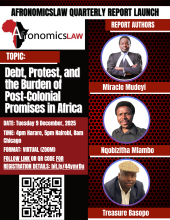Afronomicslaw Quarterly Report Launch: Debt, Protest, and the Burden of Post-Colonial Promises in Africa
This quarterly report argues that Africa’s ongoing debt crisis is deeply intertwined with the legacies of colonialism, the political pressures of post-independence governance, and the global financial system’s exploitative practices. Recently liberated African states in the 1970s and 1980s faced the dual challenge of fulfilling liberation promises, such as expanding education, healthcare, and infrastructure, while relying on favorable commodity prices to sustain economic growth. This combination of political urgency and economic optimism led to extensive borrowing, often underpinned by forced loans and unrealistic economic forecasting.
